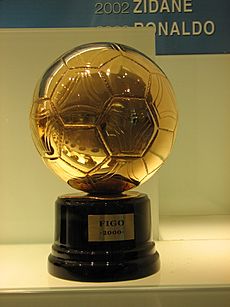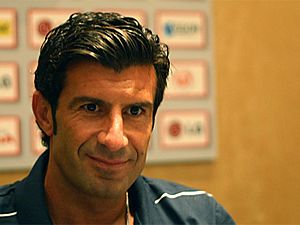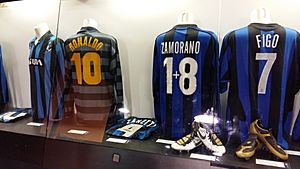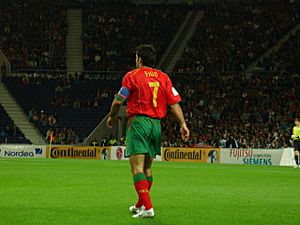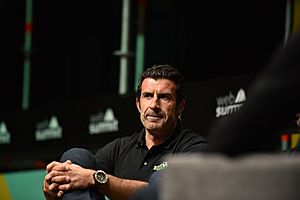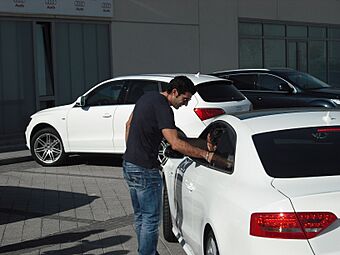Luís Figo facts for kids
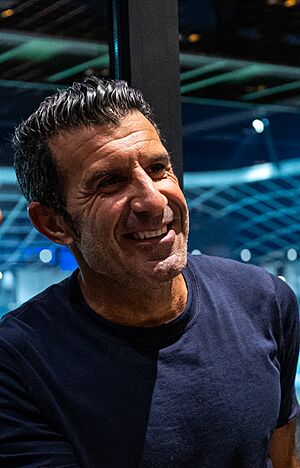
Figo in 2023
|
||||||||||||||||||||||||||||||||||||||||||||||
| Personal information | ||||||||||||||||||||||||||||||||||||||||||||||
|---|---|---|---|---|---|---|---|---|---|---|---|---|---|---|---|---|---|---|---|---|---|---|---|---|---|---|---|---|---|---|---|---|---|---|---|---|---|---|---|---|---|---|---|---|---|---|
| Full name | Luís Filipe Te Oliveira Caeiro Figo | |||||||||||||||||||||||||||||||||||||||||||||
| Date of birth | 4 November 1972 | |||||||||||||||||||||||||||||||||||||||||||||
| Place of birth | Almada, Portugal | |||||||||||||||||||||||||||||||||||||||||||||
| Height | 1.80 m (5 ft 11 in) | |||||||||||||||||||||||||||||||||||||||||||||
| Position(s) | Winger | |||||||||||||||||||||||||||||||||||||||||||||
| Youth career | ||||||||||||||||||||||||||||||||||||||||||||||
| 1984–1985 | Os Pastilhas | |||||||||||||||||||||||||||||||||||||||||||||
| 1985–1989 | Sporting CP | |||||||||||||||||||||||||||||||||||||||||||||
| Senior career* | ||||||||||||||||||||||||||||||||||||||||||||||
| Years | Team | Apps | (Gls) | |||||||||||||||||||||||||||||||||||||||||||
| 1989–1995 | Sporting CP | 129 | (16) | |||||||||||||||||||||||||||||||||||||||||||
| 1995–2000 | Barcelona | 172 | (30) | |||||||||||||||||||||||||||||||||||||||||||
| 2000–2005 | Real Madrid | 164 | (38) | |||||||||||||||||||||||||||||||||||||||||||
| 2005–2009 | Inter Milan | 105 | (9) | |||||||||||||||||||||||||||||||||||||||||||
| Total | 570 | (93) | ||||||||||||||||||||||||||||||||||||||||||||
| International career | ||||||||||||||||||||||||||||||||||||||||||||||
| 1991–2006 | Portugal | 127 | (32) | |||||||||||||||||||||||||||||||||||||||||||
|
Medal record
|
||||||||||||||||||||||||||||||||||||||||||||||
| *Club domestic league appearances and goals | ||||||||||||||||||||||||||||||||||||||||||||||
Luís Figo (born on November 4, 1972) is a famous Portuguese former footballer. He played as a winger, which is a player who runs along the sides of the field. Figo played for big clubs like Sporting CP, Barcelona, Real Madrid, and Inter Milan.
He played 127 games for the Portugal national team, which was a record at one point. Many people think Figo is one of the best players of his time and one of the greatest wingers ever.
Figo won the 2000 Ballon d'Or award and was named 2001 FIFA World Player of the Year. In 2004, the legendary player Pelé included him in his FIFA 100 list of the world's best living players. Figo is one of the few players who played for both rival Spanish clubs, Barcelona and Real Madrid. His move from Barcelona to Real Madrid in 2000 was a world record for transfer fees at €62 million.
Figo had a very successful career, winning many trophies. These include the Portuguese Cup, four Spanish league titles (La Liga), two Spanish Cups, and a UEFA Champions League title. He also won four Italian league titles (Serie A) with Inter Milan. For Portugal, he scored 32 goals and played in three European Championships and two World Cups. He helped Portugal reach the final of UEFA Euro 2004, where they finished second. He also helped them get to the semi-finals of the 2006 FIFA World Cup.
Contents
Early Life
Luís Figo was the only child of António Caeiro Figo and Maria Joana Pestana Madeira. His parents moved from Alentejo to Lisbon in the early 1970s. Figo grew up in a working-class area called Cova da Piedade, Almada.
He started playing football on the streets for a local team called Os Pastilhas. When he was 12, he joined the youth academy of Sporting CP. As a young player, Figo also played futsal, which is a type of indoor football. This helped him learn many skills that he used later in his professional career.
Club Journey
Sporting CP
Figo began his professional career at Sporting CP. He played his first league game on April 2, 1990, during the 1989–90 season. He came on as a substitute in a 1–0 win against Marítimo.
On December 7, 1991, Figo scored his first goal for Sporting against Torreense. He helped his team win 2–1. In 1991, he also played his first game for the senior national team. Before that, he had won the 1991 FIFA Under-20 World Championships and the Under-16 European Championships with Portugal's junior teams. He was part of Portugal's special "Golden Generation" of players. In his last season at Sporting, he won the Portuguese Cup in 1995.
Barcelona
In 1995, Figo was ready to join a big European club. There was a problem because he had signed contracts with two Italian clubs, Juventus and Parma. This led to a two-year ban for him from transferring to Italian clubs.
Eventually, Figo moved to the Spanish giant club Barcelona for about £2.25 million. He was loaned back to Sporting for the rest of the season because of a rule about Portuguese players moving to foreign clubs. This rule had stopped him from joining English club Manchester City earlier.
At Barcelona, Figo's career really took off. He won the 1996–97 UEFA Cup Winners' Cup and then two Spanish league titles (Primera División). He played alongside other great players like Ronaldo, Rivaldo, and Patrick Kluivert. Figo played 172 league games for Barcelona and scored 30 goals. Fans in Barcelona loved him because he brought a lot of pride to the region.
Real Madrid
In July 2000, Figo made a very surprising and controversial move to Barcelona's biggest rivals, Real Madrid. Real Madrid paid €62 million, which was a new world record fee at the time. His arrival at Madrid started the "Galáctico era" for Real Madrid, where they signed global superstar players every year.
Figo became the main focus of the Barcelona–Real Madrid rivalry. Barcelona fans felt betrayed by his transfer and turned against him. His move was a big deal because he was a star player and a leader at Barcelona. One of his former teammates said, "Our plan was simple: give the ball to Luís. He never, ever hid." Even though he was now playing for Real Madrid, he won the Ballon d'Or award in November 2000, mostly for his amazing performances with Barcelona.
When Figo returned to Barcelona for the first time in a Real Madrid shirt on October 21, 2000, the stadium was incredibly loud. Fans held up banners with words like "Traitor" and "Judas." Figo was booed constantly. When he ran onto the field, the cheers of almost 98,000 Barcelona fans grew even louder. Figo looked shocked and put his fingers in his ears. During the game, every time Figo touched the ball, the noise increased, and fans threw things like oranges, bottles, and mobile phones. Figo, who usually took corners for Madrid, did not take any that day to avoid being close to the fans. Barcelona won the game 2–0.
In his first season with Madrid, Figo won the 2001 La Liga title, scoring 14 goals. For his great play at Real, he was named the 2001 FIFA World Player of the Year. In 2001, Zinedine Zidane joined the club, and the next season Madrid won the 2001–02 UEFA Champions League.
Figo's second game back at Camp Nou, on November 23, 2002, created one of the most famous moments in the Barcelona–Real Madrid rivalry. The fans' anger had not gone away. Every time Figo came near the Barcelona fans, beer cans, lighters, bottles, and golf balls were thrown. Figo said, "I was worried that some madman might lose his head." This time, Figo decided to take corners and throw-ins. During the second half, Madrid got a corner. Amidst a shower of objects, it took Figo two minutes to take the corner. Another corner followed on the other side. As Figo walked across, he picked up some of the thrown items and smiled, giving an ironic thumbs-up. Every time he started to take the corner, another object would land. The referee stopped the game for almost 20 minutes. During this break, a pig's head was seen on camera among the debris near the corner flag, becoming a symbol of the rivalry.
Figo played five seasons at Real Madrid. His last big win there was the 2003 La Liga title. In April 2013, a sports newspaper named Marca included Figo in the "Best foreign eleven in Real Madrid's history."
Inter Milan
Figo left Real Madrid to join the Italian club Inter Milan in 2005. He moved for free because his contract with Madrid had ended. This meant Figo finally got to play for a club in Italy, something he almost did before joining Barcelona. In 2008, his fellow Portuguese, José Mourinho, became Inter's manager. This made Figo happy, as he would have more Portuguese teammates.
On May 16, 2009, Figo announced he was retiring from football. This was the same day Inter won the 2008–09 league title. He played his final game on May 31 against Atalanta. At the request of his teammate Javier Zanetti, Figo was the captain for his last match. He received a standing ovation from the crowd when he was substituted. His most memorable moment in Italy was a free-kick he scored against Roma in the 2006 Supercoppa Italiana.
Figo said, "I am leaving football, not Inter." After his last game, he said he hoped to help Inter become even greater after he retired. He also said he would work for Inter on the club board in the future. He was on the sidelines when Inter won the 2009–10 UEFA Champions League on May 22, 2010.
International Career
Early International Years
Figo was a leader of Portugal's "Golden Generation." He won a FIFA World Youth Championship in 1991. In the same year, on October 16, 1991, he played his first senior game for Portugal against Luxembourg. He was only 18 years old. His first goal for Portugal was in a 2–1 friendly win against Bulgaria in Paris on November 11, 1992.
Figo scored three goals in eight qualifying games for UEFA Euro 1996. Portugal reached the tournament for the first time in 12 years. In their last group game against Croatia, Figo scored the first goal in a 3–0 victory. This result sent Portugal to the quarter-finals as group winners.
Euro 2000 and 2002 World Cup
Figo played in all ten of Portugal's qualifying matches for UEFA Euro 2000. He scored three goals during these games. On June 12, 2000, in their first game of the tournament, he scored Portugal's first goal as they came back to beat England 3–2. Portugal again won their group but were knocked out in the semi-finals.
With six goals in nine matches, Figo helped Portugal qualify for the 2002 FIFA World Cup. On June 2, 2001, in a qualifier against the Republic of Ireland, he was captain for the first time in his 74th game. He scored the equalizing goal in a 1–1 draw. In their first World Cup since 1986, Portugal was eliminated in the group stage, and Figo did not score any goals.
Euro 2004 and 2006 World Cup
On February 18, 2004, Figo played his 100th game for Portugal in a 1–1 friendly draw with England. He was captain, even though the usual captain was also playing. Later that year, at the European Championship held in Portugal, he captained the team after the regular captain was not selected. He announced his retirement from international football after Portugal lost the UEFA Euro 2004 Final to Greece.
In June 2005, he changed his mind and returned to play for Portugal in the 2006 World Cup qualifying games.
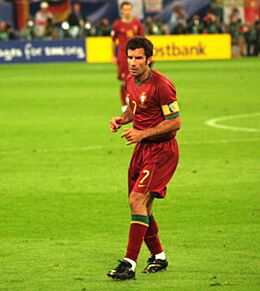
Figo captained the team during the 2006 World Cup, leading them to the semi-finals. Portugal won all three of their group games and moved to the knock-out rounds. They beat the Netherlands in the last 16 and England on penalties in the quarter-final. Figo did not take part in the penalty shootout because he had been substituted. In the semi-final, Portugal lost to France, with Zinedine Zidane scoring a penalty. This was Portugal's best World Cup finish in 40 years.
In the third-place playoff, Figo did not start the game. However, when Portugal was losing 2–0 to Germany, Figo came on as a substitute in the 77th minute. He was given the captain's armband back and received cheers from both Portuguese and German fans. Although Germany scored another goal, Figo ended his last game for his country on a high note. He set up Nuno Gomes for a goal in the 88th minute. He then passed his number 7 jersey to his successor, Cristiano Ronaldo.
Even though Portugal's "Golden Generation" did not win any major trophies, Figo led the team to their best World Cup performance since 1966. He also helped Portugal achieve their best result in the UEFA European Championship until they won it in 2016. He finished his international career with 127 games and 32 goals. He held the record for most appearances for Portugal until June 2016. He is also Portugal's fourth-highest goalscorer of all time.
How He Played
Figo is widely seen as one of the best players of his time and one of the greatest wingers ever. When he was at his best, Figo was a fast, graceful, and very skilled player. He had excellent control of the ball, quick acceleration, and amazing dribbling ability. This allowed him to often take on and beat defenders one-on-one. He would often use tricks like stepovers to get past opponents. Even though he was naturally right-footed, he could use both feet well.
Figo usually played as a winger early in his career. From this position, he could provide many assists by sending curling crosses into the box from the right side. He could also cut inside, move to the left, or connect with other midfielders to create chances for goals.
As he got older and lost some speed, he played more as a playmaking attacking midfielder, especially at Inter Milan. In this role, he was excellent because of his vision, intelligence, and wide range of passing. While he mainly created chances for others, he could also score goals himself. He had a powerful shot from far away and was accurate with free-kicks and penalties. Besides his football skills, Figo was also known for his strong leadership throughout his career.
Media Appearances
Figo has appeared in commercials for the sports company Nike. In 1996, he was in a Nike commercial called "Good vs Evil." It showed a football game in a Roman amphitheater. He played alongside other famous footballers like Ronaldo and Paolo Maldini. They defended "the beautiful game" against a team of evil warriors.
In 2002, before the World Cup, Figo starred in another Nike ad campaign called "Secret Tournament." This commercial was directed by Terry Gilliam. Figo appeared with players like Thierry Henry and Ronaldinho.
Figo is also featured in EA Sports' FIFA video game series. He was included in the Ultimate Team Legends in FIFA 14. In 2015, the company Konami announced that Figo would be a new "myClub Legend" in their football video game Pro Evolution Soccer 2016. In 2018, Figo was added as an "icon" to the Ultimate Team in FIFA 19. He has also been on Iranian television shows.
In August 2022, Netflix released El Caso Figo (The Figo Affair). This is a documentary about Figo's famous transfer from Barcelona to Real Madrid.
FIFA Presidency Campaign
On January 28, 2015, Figo announced he wanted to run for the position of FIFA president. He wanted to run against the current president, Sepp Blatter. Famous people like José Mourinho and David Beckham supported him.
In his plan, Figo said he supported making the World Cup bigger, with 48 teams. He also promised to invest more money in youth football and national football groups. Many people thought he was an outsider compared to Blatter and the other two candidates. Figo withdrew from the election on May 21, 2015. He said he did not want to be given "absolute power."
Personal Life
Figo is married to Swedish model Helen Svedin. They have three daughters: Daniela (born in 1999), Martina (born in 2002), and Stella (born in 2004).
While playing for Sporting, before moving to Barcelona, Luís Figo completed the 11th grade of school. He finished secondary school (12th grade) in Portugal in 2011, when he was 38 years old. He did this through a special program for adults. He also studied business management through a nine-month course in Madrid.
Figo can speak five languages fluently: Portuguese, Spanish, English, Italian, and French.
Other Activities
Business Ventures
Figo was briefly a co-owner of A1 Team Portugal in A1 Grand Prix racing during the 2005–06 season.
Luís Figo also has businesses in hotels, fashion, food, mining, and wine. He co-owns a fancy bar and a hotel in Portugal. In 2010, after he stopped playing football, he decided to start a company called Damash Assets. This company focuses on the mining business and has made him good profits. His wife is his partner in this company.
Figo is also the founder of Network90. This is a private website for people in the professional football industry to connect.
Charity Work
Figo is an ambassador for the Stop TB Partnership, which works to fight tuberculosis. He works closely with Inter Milan, representing the club at events across Europe. He is also on the board of the Inter Campus charity project, run by Inter Milan.
In 2003, Figo started the Fundação Luís Figo (Luís Figo Foundation) in Portugal. This charity helps children with special needs and children living in poverty.
Baller League UK
In November 2024, it was announced that Figo is set to manage a team called Trebol FC in the upcoming Baller League UK. This is a six-a-side football league.
Honours
Sporting CP
- Taça de Portugal: 1994–95
Barcelona
- La Liga: 1997–98, 1998–99
- Copa del Rey: 1996–97, 1997–98
- Supercopa de España: 1996
- UEFA Cup Winners' Cup: 1996–97
- UEFA Super Cup: 1997
Real Madrid
- La Liga: 2000–01, 2002–03
- Supercopa de España: 2001, 2003
- UEFA Champions League: 2001–02
- UEFA Super Cup: 2002
- Intercontinental Cup: 2002
Inter Milan
- Serie A: 2005–06, 2006–07, 2007–08, 2008–09
- Coppa Italia: 2005–06
- Supercoppa Italiana: 2006, 2008
Portugal Youth
- UEFA European Under-16 Championship: 1989
- FIFA World Youth Championship: 1991
Portugal
- UEFA European Championship runner-up: 2004
Individual
- UEFA European Under-21 Championship Golden Player: 1994
- Portuguese Golden Ball: 1994
- Sporting CP Player of the Year: 1994
- Portuguese Footballer of the Year: 1995, 1996, 1997, 1998, 1999, 2000
- ESM Team of the Year: 1997–98, 1999–00
- La Liga top assist provider: 1998–99, 2000–01, 2002–03
- La Liga Foreign Player of the Year: 1999, 2000, 2001
- UEFA European Championship Team of the Tournament: 2000, 2004
- World Soccer Player of the Year: 2000
- Ballon d'Or: 2000
- FIFA World Player of the Year: 2001; silver award: 2000
- El País King of European Soccer: 2000
- RSSSF Player of the Year: 2000
- UEFA Champions League top assist provider: 2000–01, 2004–05
- UEFA Team of the Year: 2003
- FIFA World Cup All-Star Team: 2006
- Inter Milan Player of the Year: 2006
- FIFA 100
- Golden Foot: 2011, as football legend
- IFFHS Legends
Orders
 Officer of the Order of Prince Henry
Officer of the Order of Prince Henry Knight of the Order of the Immaculate Conception of Vila Viçosa (House of Braganza)
Knight of the Order of the Immaculate Conception of Vila Viçosa (House of Braganza)
See also
 In Spanish: Luís Figo para niños
In Spanish: Luís Figo para niños
- List of footballers with 100 or more UEFA Champions League appearances
- List of men's footballers with 100 or more international caps
 | Sharif Bey |
 | Hale Woodruff |
 | Richmond Barthé |
 | Purvis Young |


